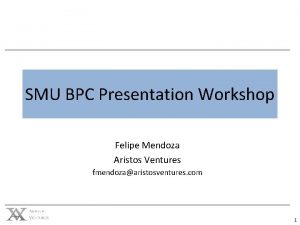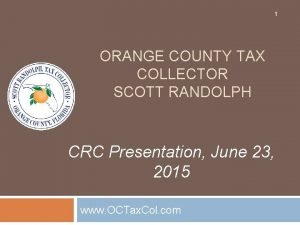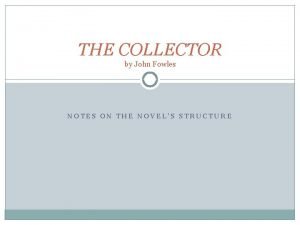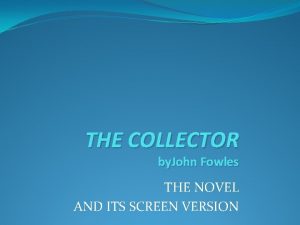JOHN FOWLES 1926 2005 The Collector The Aristos



![� [For the Victorian atheists] Christ remained, a terrible anomaly in reason. He could � [For the Victorian atheists] Christ remained, a terrible anomaly in reason. He could](https://slidetodoc.com/presentation_image_h2/9b0dc6daf6e811c2cd97edc2fcff1fa9/image-4.jpg)




- Slides: 8

JOHN FOWLES 1926 -2005

The Collector � The Aristos � The Magus � The French Lieutenant’s Woman � Poems � The Ebony Tower � Shipwreck � Daniel Martin � Islands � The Tree � The Enigma of Stonehenge � A Short History of Lyme Regis � Mantissa � A Maggot � Land � Journals �

� (…) it is no wonder that duty has become such a key concept in our understanding of the Victorian age- or for that matter, such a wet blanket in our own (1970: 29).
![For the Victorian atheists Christ remained a terrible anomaly in reason He could � [For the Victorian atheists] Christ remained, a terrible anomaly in reason. He could](https://slidetodoc.com/presentation_image_h2/9b0dc6daf6e811c2cd97edc2fcff1fa9/image-4.jpg)
� [For the Victorian atheists] Christ remained, a terrible anomaly in reason. He could not be for them what he is to so many of us today, a completely secularized figure, a man called Jesus of Nazareth with a brilliant gift for metaphor, for creating a personal mythology, for acting on his beliefs (…). Between the cruelties of our own age and our guilt we have erected a vast edifice of government-administered welfare and aid; charity is fully organized (1970: 282).

I do not know. This story I am telling is all imagination (…). I am writing in (just as I have assumed some of the vocabulary and “voice” of) a convention universally accepted at the time of my story: that the novelist stands next to God (…). So perhaps I am writing a transposed autobiography; perhaps I now live in one of the houses I have brought into the fiction (…). Perhaps it is only a game (…). Or perhaps I am trying to pass off a concealed book of essays on you. Instead of chapter headings, perhaps I should have written “On the Horizontality of Existence, ” “The Illussions of Progress, ” “The History of the Novel Form, ” “The Aetiology of Freedom, ” “Some Forgotten Aspects of the Victorian Age”… what you will (1970: 8081).

� The novelist is still a god, since he creates (and not even the most aleatory avant-garde modern novel has managed to extirpate its author completely); what has changed is that we are no longer the gods of the Victorian image, omniscient and decreeing; but in the new theological image, with freedom our first principle, not authority (1970: 82).

I’ll spread sail of silver and I’ll steer towards the sun, And my false love will weep, and my false love will weep, And my false love will weep for me after I’m gone (1970: 11).















